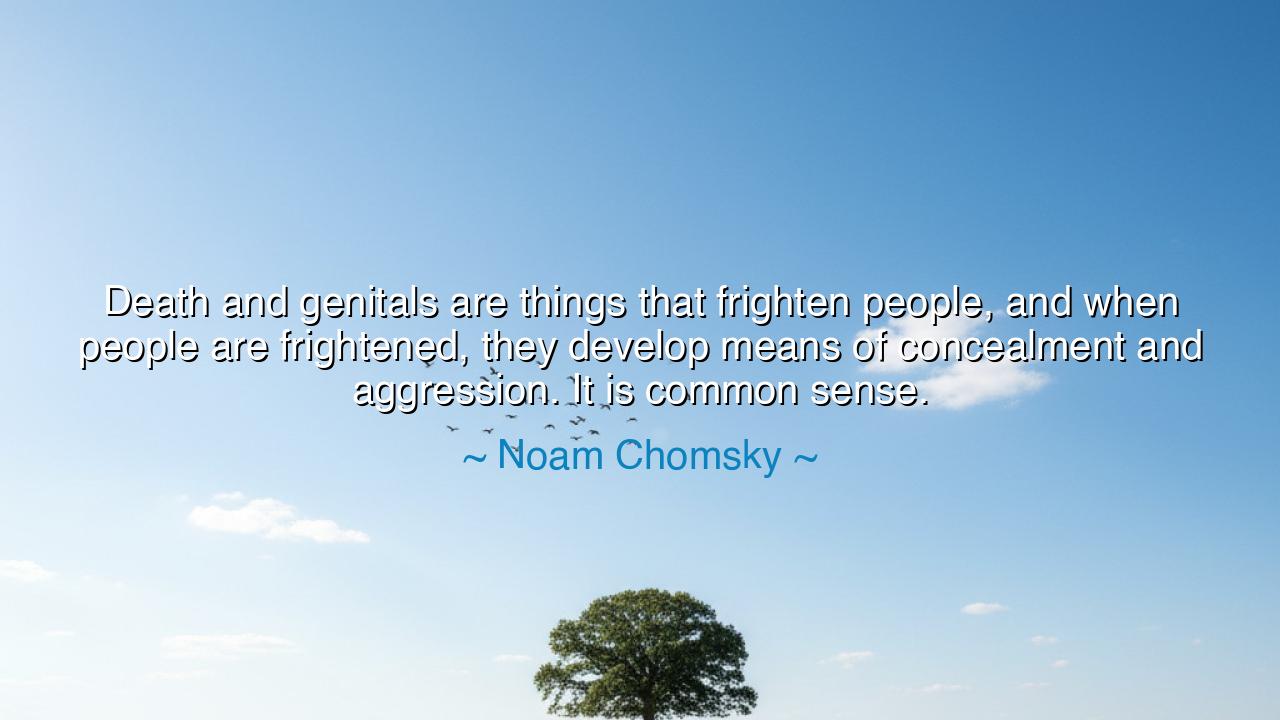
Death and genitals are things that frighten people, and when
Death and genitals are things that frighten people, and when people are frightened, they develop means of concealment and aggression. It is common sense.






In the words of Noam Chomsky, the great thinker who unraveled the hidden mechanisms of language and power, there is a truth as ancient as humankind itself: “Death and genitals are things that frighten people, and when people are frightened, they develop means of concealment and aggression. It is common sense.” In this reflection lies the duality of our existence — the fear of the end, and the fear of our beginning. The body that gives life also reminds us of our mortality. The cycle of creation and decay, embodied in our physical being, awakens both reverence and terror in the human soul. It is this fear that drives civilizations to build temples, write laws, and fashion taboos — to make sense of what they cannot face directly.
From the dawn of time, humankind has sought to veil the two ultimate realities — birth and death. The genitals, symbols of life and continuity, are hidden not only out of modesty, but out of awe. They remind us that we are creatures of flesh, bound by desire, dependent on the instincts we cannot wholly control. Likewise, death confronts us with the end of individuality, the dissolution of form, the great silence that follows all striving. To look upon either too closely is to feel the trembling of the eternal void within ourselves. And so, in our trembling, we hide — behind garments, rituals, euphemisms, and beliefs.
When fear takes root, the heart often does not seek understanding; it seeks protection. Chomsky speaks of concealment and aggression, and indeed, history bears witness to both. What man cannot bear to contemplate, he buries beneath shame, or strikes down in hatred. The fear of the body has bred puritanism, the fear of death has bred war. The same hands that carve idols of the gods who promise immortality also forge weapons to destroy those who threaten their illusion. Thus, fear becomes the seed of both sanctity and violence — two branches of the same ancient tree.
Consider the story of Medieval Europe, when plague swept through the lands and death seemed to walk in every street. In their terror, men turned upon one another. They accused witches, foreigners, and the unclean, seeking scapegoats to satisfy their dread. The concealment took form in ritual cleansing and false piety; the aggression erupted in persecution. Yet behind both lay the same primal fear: that man is mortal, and no prayer nor law can make him otherwise. Death, unmasked, became unbearable, and so it was buried beneath superstition and blood.
Yet there were also those who looked directly into the abyss and found peace. The Stoics of old, and the sages of the East, taught that to accept the reality of death and the nature of desire is to free oneself from bondage. They understood that fear loses its dominion when met with understanding. Marcus Aurelius, emperor and philosopher, once wrote, “You may leave this life at any moment; let that determine what you do and say and think.” In his calm acceptance, he defied both concealment and aggression, transforming fear into wisdom.
The lesson, then, is not to flee from what frightens us, but to behold it with open eyes. When we face our mortality, we become humble; when we accept our physical nature, we become compassionate. Concealment breeds ignorance; aggression breeds suffering. But knowledge — the kind that comes from courage — dissolves fear like the morning sun dissolves the mist. To live well is to live without hiding from the truth of our flesh and the certainty of our end.
Therefore, let each person who hears these words take them to heart: embrace the human condition. Do not despise your body, nor fear your death. They are the gates through which all wisdom enters. The one teaches you creation; the other, impermanence. Together they whisper the secret that philosophers, saints, and poets have all sought — that peace is not found in denying fear, but in understanding it. For as Chomsky reminds us, it is indeed common sense — the wisdom of the ancients, spoken anew through the tongue of a modern sage.






AAdministratorAdministrator
Welcome, honored guests. Please leave a comment, we will respond soon